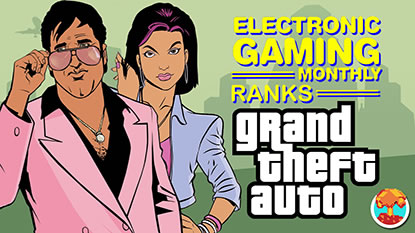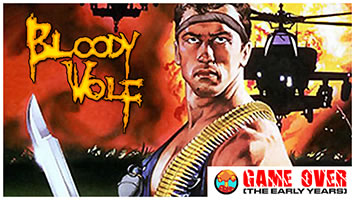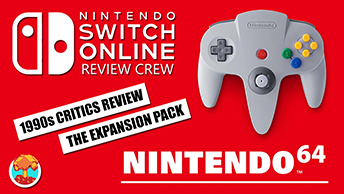- CLASSIC MAGAZINES
- REVIEW CREW
A show recapping what critics thought back
when classic games first came out! - NEXT GENERATION'S BEST & WORST
From the worst 1-star reviews to the best
5-stars can offer, this is Next Generation! - NINTENDO POWER (ARCHIVE)
Experience a variety of shows looking at the
often baffling history of Nintendo Power! - MAGAZINE RETROSPECTIVE
We're looking at the absolutely true history of
some of the most iconic game magazines ever! - SUPER PLAY'S TOP 600
The longest and most ambitious Super NES
countdown on the internet! - THEY SAID WHAT?
Debunking predictions and gossip found
in classic video game magazines! - NEXT GENERATION UNCOVERED
Cyril is back in this spin-off series, featuring the
cover critic review the art of Next Generation! - HARDCORE GAMER MAGAZING (PDF ISSUES)
Download all 36 issues of Hardcore Gamer
Magazine and relive the fun in PDF form!
- REVIEW CREW
- ELECTRONIC GAMING MONTHLY
- ELECTRONIC GAMING MONTHLY RANKS
From Mario to Sonic to Street Fighter, EGM
ranks classic game franchises and consoles! - ELECTRONIC GAMING MONTHLY BEST & WORST
Counting down EGM’s best and worst reviews
going year by year, from 1989 – 2009! - ELECTRONIC GAMING BEST & WORST AWARDS
11-part video series chronicling the ups and
downs of EGM’s Best & Worst Awards!
- ELECTRONIC GAMING MONTHLY RANKS
- GAME HISTORY
- GAME OVER: STORY BREAKDOWNS
Long-running series breaking down game
stories and analyzing their endings! - A BRIEF HISTORY OF GAMING w/ [NAME HERE]
Real history presented in a fun and pithy
format from a variety of game historians! - THE BLACK SHEEP
A series looking back at the black sheep
entries in popular game franchises! - INSTANT EXPERT
Everything you could possibly want to know
about a wide variety of gaming topics! - FREEZE FRAME
When something familiar happens in the games
industry, we're there to take a picture! - I'VE GOT YOUR NUMBER
Learn real video game history through a series
of number-themed episodes, starting at zero! - GREAT MOMENTS IN BAD ACTING
A joyous celebration of some of gaming's
absolute worst voice acting!
- GAME OVER: STORY BREAKDOWNS
- POPULAR SHOWS
- DG NEWS w/ LORNE RISELEY
Newsman Lorne Riseley hosts a regular
series looking at the hottest gaming news! - REVIEW REWIND
Cyril replays a game he reviewed 10+ years
ago to see if he got it right or wrong! - ON-RUNNING FEUDS
Defunct Games' longest-running show, with
editorials, observations and other fun oddities! - DEFUNCT GAMES QUIZ (ARCHIVE)
From online quizzes to game shows, we're
putting your video game knowledge to the test!- QUIZ: ONLINE PASS
Take a weekly quiz to see how well you know
the news and current gaming events! - QUIZ: KNOW THE GAME
One-on-one quiz show where contestants
find out if they actually know classic games! - QUIZ: THE LEADERBOARD
Can you guess the game based on the classic
review? Find out with The Leaderboard!
- QUIZ: ONLINE PASS
- DEFUNCT GAMES VS.
Cyril and the Defunct Games staff isn't afraid
to choose their favorite games and more! - CYRIL READS WORLDS OF POWER
Defunct Games recreates classic game
novelizations through the audio book format!
- DG NEWS w/ LORNE RISELEY
- COMEDY
- GAME EXPECTANCY
How long will your favorite hero live? We crunch
the numbers in this series about dying! - VIDEO GAME ADVICE
Famous game characters answer real personal
advice questions with a humorous slant! - FAKE GAMES: GUERILLA SCRAPBOOK
A long-running series about fake games and
the people who love them (covers included)! - WORST GAME EVER
A contest that attempts to create the worst
video game ever made, complete with covers! - LEVEL 1 STORIES
Literature based on the first stages of some
of your favorite classic video games! - THE COVER CRITIC
One of Defunct Games' earliest shows, Cover
Critic digs up some of the worst box art ever! - COMMERCIAL BREAK
Take a trip through some of the best and
worst video game advertisements of all time! - COMIC BOOK MODS
You've never seen comics like this before.
A curious mix of rewritten video game comics!
- GAME EXPECTANCY
- SERIES ARCHIVE
- NINTENDO SWITCH ONLINE ARCHIVE
A regularly-updated list of every Nintendo
Switch Online release, plus links to review! - PLAYSTATION PLUS CLASSIC ARCHIVE
A comprehensive list of every PlayStation
Plus classic release, including links! - RETRO-BIT PUBLISHING ARCHIVE
A regularly-updated list of every Retro-Bit
game released! - REVIEW MARATHONS w/ ADAM WALLACE
Join critic Adam Wallace as he takes us on a
classic review marathon with different themes!- DEFUNCT GAMES GOLF CLUB
Adam Wallace takes to the links to slice his way
through 72 classic golf game reviews! - 007 IN PIXELS
Adam Wallace takes on the world's greatest spy
as he reviews 15 weeks of James Bond games! - A SALUTE TO VAMPIRES
Adam Wallace is sinking his teeth into a series
covering Castlevania, BloodRayne and more! - CAPCOM'S CURSE
Adam Wallace is celebrating 13 days of Halloween
with a line-up of Capcom's scariest games! - THE FALL OF SUPERMAN
Adam Wallace is a man of steel for playing
some of the absolute worst Superman games! - THE 31 GAMES OF HALLOWEEN
Adam Wallace spends every day of October afraid
as he reviews some of the scariest games ever! - 12 WEEKS OF STAR TREK
Adam Wallace boldly goes where no critic has
gone before in this Star Trek marathon!
- DEFUNCT GAMES GOLF CLUB
- DAYS OF CHRISTMAS (ARCHIVE)
Annual holiday series with themed-episodes
that date all the way back to 2001!- 2015: 30 Ridiculous Retro Rumors
- 2014: 29 Magazines of Christmas
- 2013: 29 Questionable Power-Ups of Christmas
- 2012: 34 Theme Songs of Christmas
- 2011: 32 Game Endings of Christmas
- 2010: 31 Bonus Levels of Christmas
- 2009: 30 Genres of Christmas
- 2008: 29 Controls of Christmas
- 2007: 34 Cliches of Christmas
- 2006: 33 Consoles of Christmas
- 2005: 32 Articles of Christmas
- 2004: 31 Websites of Christmas
- 2003: 29 Issues of Christmas
- 2002: 28 Years of Christmas
- 2001: 33 Days of Christmas
- NINTENDO SWITCH ONLINE ARCHIVE
- REVIEW ARCHIVE
- FULL ARCHIVE
Looking for Games in the Muslim World
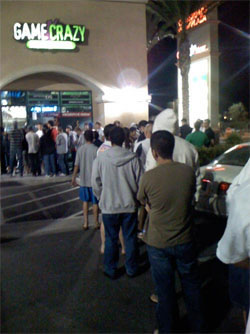
These people are all lining up to buy Halo 3, something you just don't see when buying new games in Qatar!
Buying a video game in the Middle East is not nearly so simple.
Console games sold in North America are all encoded with the same region; NTSC-U. In the rest of the world there are 2 other kinds of region encoding, known as PAL (for European countries) and NTSC-J (which is used in some parts of Asia, including Japan). Originally there was a good reason to have multiple regions. PAL televisions output at a lower frame rate (25 FPS vs. 30 FPS) but
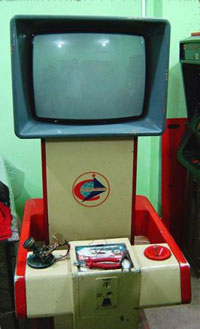
With all this confusion about PAL and NTSC, how am I supposed to figure out what this old Russian arcade machine is supposed to play?
In the Middle East there is no standard as to what region games should be sold in. PlayStation 2, PlayStation 3, Xbox and Xbox 360 games are sold in PAL format, while the Wii can be found in both PAL and NTSC-U forms (NTSC seems to be more common in Qatar). Good luck finding
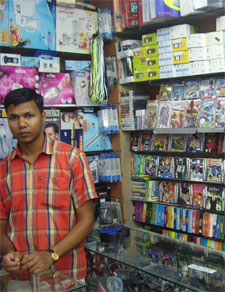
The shops in Qatar are packed full of colorful boxes and games, unfortunately the quality isn't always what you expect!
There are more benefits to this kind of importing than simple region encoding. Game prices in Qatar are similar to those in the U.K. (albeit still cheaper most of the time). A Wii or PlayStation 3 game will usually run you around 75 dollars, while the consoles themselves often cost 100 dollars (in the PS3s case 300 dollars) more than normally expected. A few months after the Wii came out I saw one going for over a
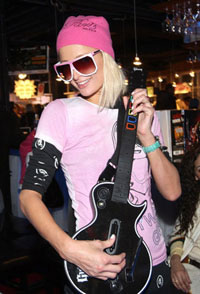
Say what you will about game prices in the Middle East at least you don't have to put up with Paris Hilton pretending to be excited about the newest guitar game!
Pricing and region coding are further complicated (or one could say simplified) by an additional factor: modding. Most consoles sold in the Middle East, even at mainstream vendors such as the French "Carrefour" (our version of Wal-Mart), are modded. While this does account for the price difference, it also adds a new dimension to video-game buying. These modded consoles do not go unsupported in stores.
In the Middle-East there is something called a "souqe," roughly translated as "shop." While there is nothing remarkable about a single souqe (they are usually quite small), the way they are organized is very unusual. For example, there is a place near my house called Sofitel. In this two story building there are about 30 souqes which all sell computers. Each store might specialize in
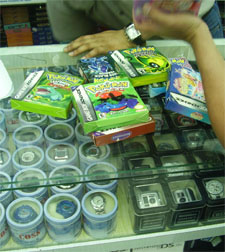
They may look real, but this is yet another example of a store trying to sell fake Pokemon games!
Buying a video game is usually a similar experience to the one described above. There is a street which is made up of souqes selling toys, clothes, phones, DVDs and video games. You would be hard pressed to find a legal DVD on this street, and while it is possible to find a few legit games (mostly for the PSP) in the end if you buy a game here, you're probably going to need a modded console to run it. The exception to that rule is Game Boy and Game Boy Advance games. (It is also worth noting the DS games which are a combination of legal carts and ones with combinations of 5 or 6 games on them.) The illegal
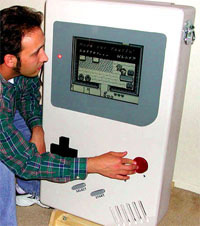
Like the games found in Qatar, this SUPER HUGE Game Boy is also not made by Nintendo!
While Ismail was helpful and knowledgeable about his product, not everyone I talked to was as forthcoming. I tried to explain to someone in another store, "These games, we know that they are not made by Nintendo. Where do they come from?" To which he replied, "No, no. This is Game Boy, not Nintendo". That conversation went one for about 45 seconds and was quite frustrating. At another store I tried to buy a copy of FarCry Instincts for my original Xbox, but the salesman refused to let me take a picture of the binder containing the fake game labels. This is a shame
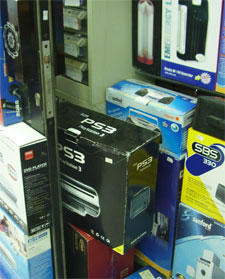
I don't know about you, but I love the idea of being able to play Gunstar Heroes and Thunder Force III on my PlayStation 3!
On top of all the insanity that buying new games involves there is one hanger-on from the 1980s that you can still buy in the Middle East - The Sega Mega Drive. It can be found in a number of different forms ranging from an actual box with Mega Drive 2 written on it (new for 2006) to ones that look like small PlayStation 3s (you'll be happy to know that I asked, and no one has ever thought that they were buying a real PS3 and wound up with a Genesis). The boxes for these are pure comedic gold and feature such classic lines as "High end 8-bit technology".
Not all countries I have visited are created equal in the eyes of fake game sellers. When I was in Jordan I found stack of PC games for $1.50 a disc, but console sales were limited to a few
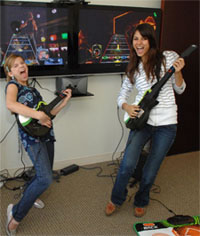
No, seriously, at least you don't have to put up with stupid photo ops in Qatar!
The primary reason that fake games are so widely available in the Middle East is lack of copyright enforcement. However, I believe that there is a less obvious reason that it has become so prevalent. There is a huge immigrant workforce, especially in the rapidly growing Qatar (the population is 20% Qatari, 80% ex-patriot). These workers are rarely paid more than 600 dollars a month and send most of that off to their families in India, Nepal or the Philippines. They have virtually no disposable income, but since it is common for 20 of them to live in a single small building, with no entertainment but a single television, it seems quite likely that workers will pool their money and purchase cheap games to pass the time. This is all speculation, but it is almost certainly a factor in explaining why fake gaming has grown so rapidly.
So next time you walk into EB Games and buy a copy of Dead Rising, remember that some of us aren't so lucky and have to rely on (very) cheap knock-offs for our gaming fix. By the way, next time you come to Qatar could you bring me a copy of No More Heroes? It costs way to much here.
HOME |
CONTACT |
NOW HIRING |
WHAT IS DEFUNCT GAMES? |
NINTENDO SWITCH ONLINE |
RETRO-BIT PUBLISHING
Retro-Bit |
Switch Planet |
The Halcyon Show |
Same Name, Different Game |
Dragnix |
Press the Buttons
Game Zone Online | Hardcore Gamer | The Dreamcast Junkyard | Video Game Blogger
Dr Strife | Games For Lunch | Mondo Cool Cast | Boxed Pixels | Sega CD Universe | Gaming Trend
Game Zone Online | Hardcore Gamer | The Dreamcast Junkyard | Video Game Blogger
Dr Strife | Games For Lunch | Mondo Cool Cast | Boxed Pixels | Sega CD Universe | Gaming Trend
Copyright © 2001-2025 Defunct Games
All rights reserved. All trademarks are properties of their respective owners.
All rights reserved. All trademarks are properties of their respective owners.













